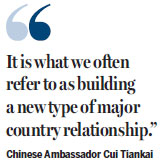G20 seen as boost for bilateral ties
The upcoming summit between President Xi Jinping and his US counterpart Barack Obama is expected to inject strong momentum into the bilateral relationship, according to China's top diplomat in Washington.
The White House announced on Aug 18 that Obama will attend his final G20 summit in Hangzhou (Sept 4-5) and also will conduct in-depth meetings with Xi covering a wide range of global, regional and bilateral issues.
Cui Tiankai, the Chinese ambassador to the United States, said on Aug 20 that the two leaders have held several strategic summits in past years and each has produced a positive and important impact.
"The summits have provided very powerful guidance in developing the bilateral relationship between the two countries, expanding cooperation and managing their differences," Cui told the media. "I believe it will be the same this time."
He noted that Hangzhou, the venue for the upcoming summit, is special because it was the city where the historic Shanghai Communique was produced four decades ago.

The communique, officially signed in Shanghai during President Richard Nixon's historic trip to China in February 1972, set the course for the normalization of diplomatic relations between the two countries. But much of the intense discussion for the document took place in scenic Hangzhou, about 110 miles from Shanghai.
Cui believes that the past predicts the future. He said the last 40 years have shown that China and the US should continue to cooperate to build the partnership.
"It is what we often refer to as building a new type of major country relationship," he said.
The new type of major country relationship was proposed by Xi in February 2012, when he toured the US as China's vice-president.
Cui said China and the US have had much coordination and cooperation since the G20 mechanism was established and have had good communications this time.
"I think the world expects China and the US to continue to play a leadership and constructive role this year to make the G20 summit a complete success," he said.
Experts said that disagreements will remain between China and the United States on key issues, such as the South China Sea and the planned deployment of the Terminal High Altitude Area Defense anti-missile system in the Republic of Korea, but the two leaders will likely strive to reach a consensus.
Tao Wenzhao, a researcher in Sino-US relations at the Chinese Academy of Social Sciences, said the talks between Xi and Obama will be "of great importance" to bilateral relations. However, the relationship will continue to experience "ups and downs" with unresolved disputes on issues including the South China Sea and THAAD, he said.
"It will be the 'new normal' (a term usually used to describe China's ongoing economic structural adjustment) of the Sino-US relationship, with fluctuations from time to time," he said, adding that such ups and downs are likely to continue with the next president.
Zuo Xiying, a researcher of US foreign policy at Renmin University, said the possibility could not be ruled out that Obama might "point fingers at China" on the South China Sea issue during multilateral meetings in Laos.
"China will definitely not accept accusations by the US," he said.
Obama's visit to Laos after the summit, the first visit to the country by a US president, will send a signal to Southeast Asian countries that the US will maintain its presence in the region, he added.
An Baijie in Beijing contributed to this story.
chenweihua@chinadailyusa.com


















